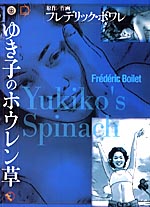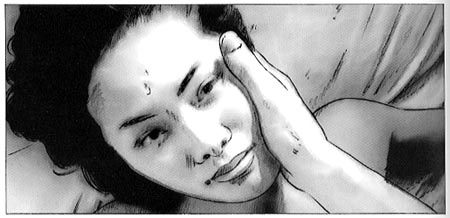 By Frédéric Boilet
By Frédéric Boilet
144 pages, black and white
Published by Fanfare/Ponent Mon
When do people fall in love? Is it slowly and over time, or is it quickly and without warning? More importantly, can both occur to someone at the same time? Frédéric Boilet’s Yukiko’s Spinach seems to wonder that very question, even as the narrator seems already sure of its answer…
He first met Yukiko Hashimoto at an art opening. She was gorgeous, funny, and instantly stole his heart. The only problem is that while she does love him a little bit, she loves Horiguchi even more. Now he must try and conquer Yukiko’s instant love for Horiguchi with a slow build up of love for him. But is he fighting the inevitable?
Boilet’s narrator (who while never identified by name is clearly supposed to be a facsimile of himself) has such an air of hope about him that it’s easy to see how one gets pulled into the story of Yukiko’s Spinach. On one level you can’t help but feel a little sad for him, someone whose heart is stolen by a person that does not return the same level of affection back. At the same time, though, the narrator has an almost pathetic streak about him, as he keeps pushing forward towards a woman who has already said she’s more in love with someone else. It’s this balance that kept me interested in Yukiko’s Spinach, with a wistful ideal tempered with reality. These aren’t perfect people by any stretch of the imagination, and their flaws ultimately make them more interesting.

With the protagonist of Yukiko’s Spinach being a comic book artist, it’s easy for Boilet to incorporate notes, sketches, and doodles into the book as part of the storytelling. What really surprised, me, then, was how well this device worked. It adds a level of realism to Yukiko’s Spinach, like we’re somehow peeking into the lives of people that live half a world away. It helps a great deal that Boilet’s art is realistic to the point where one wonders if he uses photographs as reference; Yukiko and the rest of the cast are drawn beautifully in gentle pencil strokes that look like they could come to life at a moment’s notice. The panels in Yukiko’s Spinach look like they were filmed through a soft filter, where even the sexual scenes always look gentle and unthreatening. It’s an important quality, since in the harsh light of day some of the characters of Yukiko’s Spinach may come across as a bit less admirable or even interesting. Boilet chose his approach well, and the end result is a stronger graphic novel.
Yukiko’s Spinach is not your average love story, but it is very much a story that showcases the power of love. Within pages I was entranced by Boilet’s story (the truth or fiction is never disclosed one way or the other) and I can’t wait to see more of Boilet’s comics in English. A Frenchman who moved to Japan, Boilet brings the best of both worlds to his creation.
Purchase Links:
